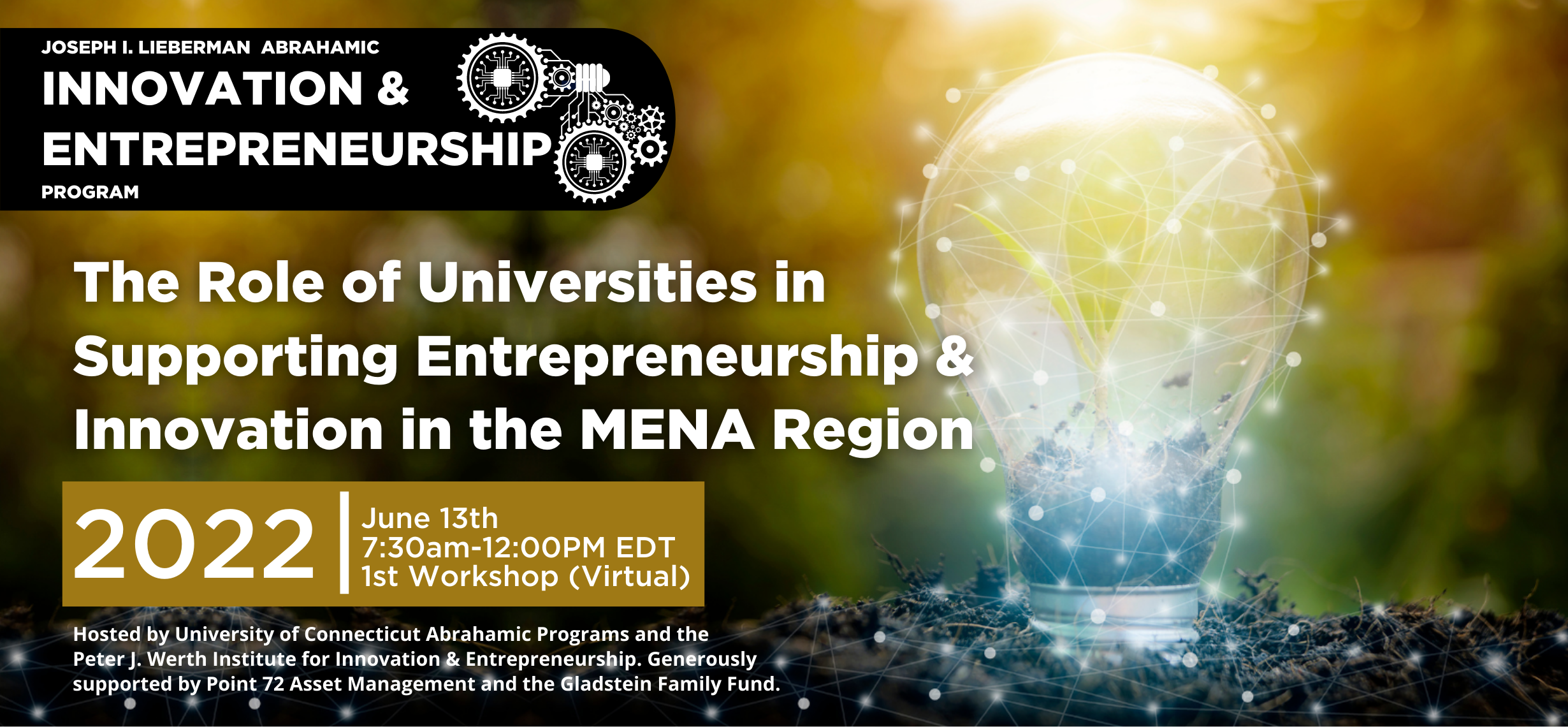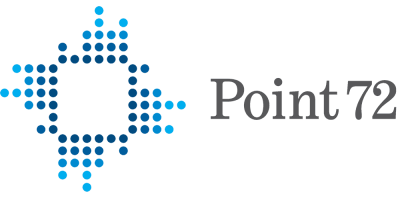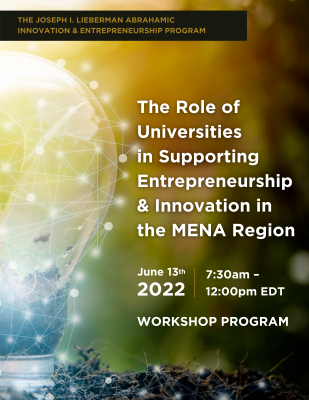
The Role of Universities in Supporting Entrepreneurship & Innovation in the MENA Region
Monday, June 13, 2022 | 7:30 AM - 12:00 PM EDT | Virtual, by invitation only
The initial Joseph I. Lieberman Abrahamic Innovation & Entrepreneurship Program Workshop, presented by the University of Connecticut Abrahamic Programs for Academic Collaboration in the MENA Region and the Peter J. Werth Institute for Entrepreneurship and Innovation, with support from Point 72 and the Gladstein Family, will highlight how universities can spur cross-national entrepreneurship and innovation as a means of supporting inclusive economic development, peace, and cooperation in the region. We will consider the role of universities in promoting entrepreneurship and innovation within the MENA region, as well as explore common challenges and opportunities for interfaith and cross- border collaboration in light of the Abraham Accords. We will identify best practices and link MENA economic and social development processes with those in the State of Connecticut.
Accordingly, this workshop will bring together 15-20 scholars and university administrators, as well as 15-20 public servants, entrepreneurs, and investors from Connecticut, USA, and MENA countries. Participants will come from countries including Bahrain, Egypt, Iraq, Israel, Jordan, Kuwait, Morocco, Oman, Qatar, Saudi Arabia, Turkey, United Arab Emirates, Unites States of America and others. University participants must either live in and/or perform new collaborative research to improve entrepreneurship and innovation in the MENA region. Overall, the workshop will: 1) build a community of university leaders dedicated to scaling up entrepreneurship and innovation across the MENA region; 2) create dialogue between academics, business leaders, and policymakers with regard to actions universities can take to support inclusive innovation and entrepreneurship in the MENA region as a result of the Abraham Accords; and 3) contribute to regional peace-making through integrated economic development.
In order to foment further progress on developing the role of Middle Eastern and North African universities in local, national, and regional entrepreneurial ecosystems, we plan to facilitate follow-up research meetings and collaborative projects.
Schedule
The below schedule is in EDT, please view time zones here.
7:30 AM | WELCOME & OPENING REMARKS
Zaid Eyadat, Ph.D., Vice President for International Affairs & Professor of Political Science, University of Jordan
Daniel Weiner, Ph.D., Vice President for Global Affairs & Professor of Geography, UConn
Senator Joseph I. Lieberman, Former United States Senator from Connecticut
7:45 AM | INTRODUCTIONS
All participants will have the opportunity to introduce themselves and their organization.
8:20 AM | SESSION I – THE ROLE OF UNIVERSITIES IN NATIONAL ENTREPRENEURSHIP ECO-SYSTEMS
Discussants:
Şeyda Ateş, General Manager, Technopolis Technology Transfer Centre, Hacettepe University
Ryan Coles, Ph.D., Assistant Professor of Management & Entrepreneurship, UConn
Rona Samler, General Manager of T3, Technion Institute of Science & Technology
Google, Gatorade, Mobileye, and Genentech are all University spinout companies, highlighting the growing importance of University research commercialization in regional entrepreneurial eco-systems. Universities are centers of R&D, entrepreneurship education, and a social nexus of innovators, investors and policymakers that are crucial to high-growth entrepreneurship that stimulates local employment and socio-economic development. In this session, attendees will discuss common characteristics of entrepreneurial universities drawing from cases in the U.S., Israel and Saudi Arabia.
9:20 AM BREAK
9:30 AM | SESSION II – BREAKOUTS: BUILDING THE ENTREPRENEURIAL UNIVERSITY
Facilitators:
Itzik Goldwaser, Ph.D., CEO of Yissum, Hebrew University
Mostafa Analoui, Ph.D., Executive Director, Technology Transfer, University of Connecticut
In this session, we discuss best practices and lessons learned from university entrepreneurship systems (pedagogy, events and programs) that successfully 1) commercialize research via academic spinouts, 2) prepare students to be future entrepreneurs and 3) make entrepreneurship more accessible as a career path for marginalized members of society.
10:00 AM | SESSION III – BREAKOUT SYNTHESIS
10:30 AM BREAK
10:40 AM | SESSION IV – MOVING FORWARD
Ryan Coles, Ph.D., Assistant Professor of Management & Entrepreneurship, UConn
Daniel Weiner, Ph.D., Vice President for Global Affairs & Professor of Geography, UConn
Taking insights from the virtual conversations, participants will outline a set of action items for the Lieberman Program that are aimed at 1) increasing the entrepreneurial nature of Universities in the MENA region; 2) increasing inter-university research commercialization in the MENA region; 3) facilitating student collaboration across the MENA region; 4) empowering historically marginalized people and groups; and 5) other ideas as they emerge. The participants’ agreed upon action items will also serve as the basis for the agenda of the fall summit in Stamford, CT.
11:40 AM | CLOSING REMARKS
David Noble, Ph.D., Director of the Peter J. Werth Institute for Entrepreneurship and Innovation and Associate Professor In-Residence, UConn
Sheikh Talal Al-Madi, Sheikh of the Al-Issa Tribe and Former Member of the Jordanian Senate
Case Study Reading:
"The Edison of Medicine" by Steven Prokesch, Harvard Business Review, March-April 2017.
Workshop supported by:


